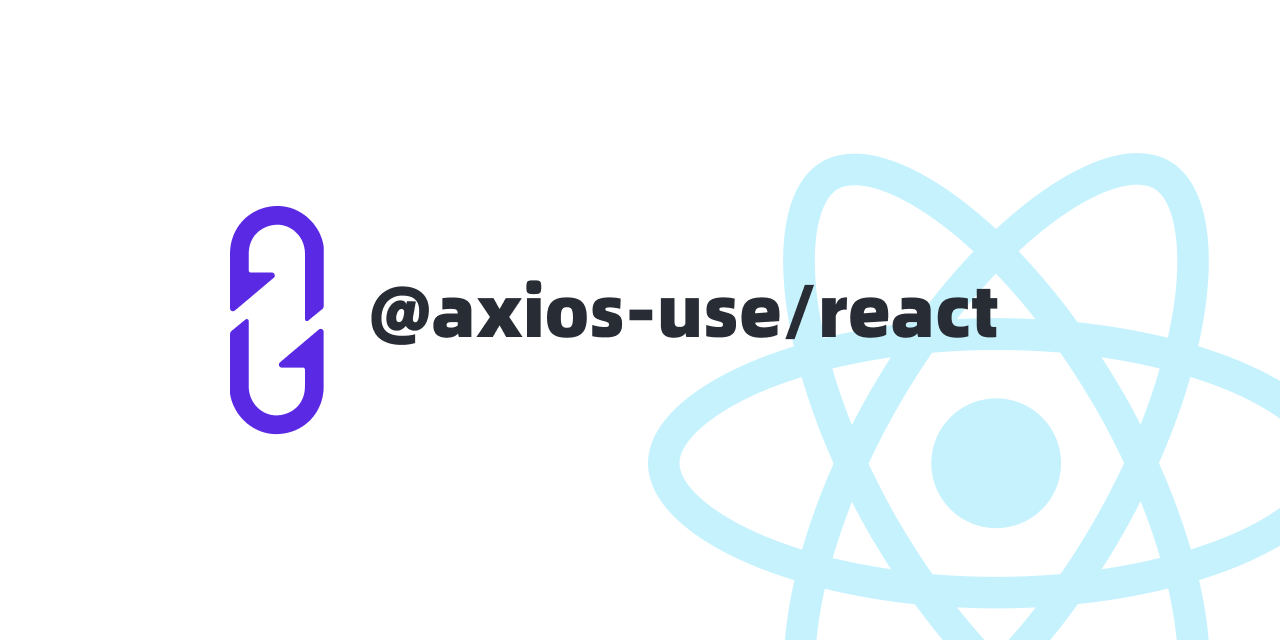
Usage
Install
npm i axios @axios-use/reactQuick Start
import { useResource } from "@axios-use/react";function Profile({ userId }) { const [{ data, error, isLoading }] = useResource( (id) => ({ url: `/user/${id}` }), [userId] ); if (error) return <div>failed to load</div>; if (isLoading) return <div>loading...</div>; return <div>hello {data.name}!</div>;}import { useRequest, useResource } from "@axios-use/react";RequestProvider
import axios from "axios";import { RequestProvider } from "@axios-use/react";// custom Axios instance. https://github.com/axios/axios#creating-an-instanceconst axiosInstance = axios.create({ baseURL: "https://example.com/",});ReactDOM.render( // custom instance <RequestProvider instance={axiosInstance}> <App /> </RequestProvider>, document.getElementById("root"));RequestProvider config
| config | type | explain |
|---|---|---|
| instance | object | axios instance |
| cache | object | false | Customized cache collections. Or close. (Default on) |
| cacheKey | function | Global custom formatted cache keys |
| cacheFilter | function | Global callback function to decide whether to cache or not |
| customCreateReqError | function | Custom format error data |
useRequest
| option | type | explain |
|---|---|---|
| fn | function | get AxiosRequestConfig function |
| options.onCompleted | function | This function is passed the query's result data. |
| options.onError | function | This function is passed an RequestError object |
| options.instance | AxiosInstance | Customize the Axios instance of the current item |
// jsconst [createRequest, { hasPending, cancel }] = useRequest((id) => ({ url: `/user/${id}`, method: "DELETE",}));// tsxconst [createRequest, { hasPending, cancel }] = useRequest((id: string) => // response.data: Result. AxiosResponse<Result> request<Result>({ url: `/user/${id}`, method: "DELETE", }));interface CreateRequest { // Promise function ready: () => Promise<[Payload<TRequest>, AxiosResponse]>; // Axios Canceler. clear current request. cancel: Canceler;}type HasPending = boolean;// Axios Canceler. clear all pending requests(CancelTokenSource).type Cancel = Canceler;useEffect(() => { const { ready, cancel } = createRequest(id); ready() .then((res) => { console.log(res); }) .catch((err) => { console.log(err); }); return cancel;}, [id]);// options: onCompleted, onErrorconst [createRequest, { hasPending, cancel }] = useRequest( (id) => ({ url: `/user/${id}`, method: "DELETE", }), { onCompleted: (data, response) => console.info(data, response), onError: (err) => console.info(err), });useResource
| option | type | explain |
|---|---|---|
| fn | function | get AxiosRequestConfig function |
| parameters | array | false | fn function parameters. effect dependency list |
| options.cache | object | false | Customized cache collections. Or close |
| options.cacheKey | string| number | function | Custom cache key value |
| options.cacheFilter | function | Callback function to decide whether to cache or not |
| options.filter | function | Request filter. if return a falsy value, will not start the request |
| options.defaultState | object | Initialize the state value. {data, response, error, isLoading} |
| options.onCompleted | function | This function is passed the query's result data. |
| options.onError | function | This function is passed an RequestError object |
| options.instance | AxiosInstance | Customize the Axios instance of the current item |
// jsconst [{ data, error, isLoading }, fetch, refresh] = useResource((id) => ({ url: `/user/${id}`, method: "GET",}));// tsxconst [reqState, fetch, refresh] = useResource((id: string) => // response.data: Result. AxiosResponse<Result> request<Result>({ url: `/user/${id}`, method: "GET", }));interface ReqState { // Result data?: Payload<TRequest>; // axios response response?: AxiosResponse; // normalized error error?: RequestError<Payload<TRequest>>; isLoading: boolean; cancel: Canceler;}// `options.filter` will not be calledtype Fetch = (...args: Parameters<TRequest>) => Canceler;// 1. Same as `fetch`. But no parameters required. Inherit `useResource` parameters// 2. Will call `options.filter`type Refresh = () => Canceler | undefined;The request can also be triggered passing its arguments as dependencies to the useResource hook.
const [userId, setUserId] = useState();const [reqState] = useResource( (id) => ({ url: `/user/${id}`, method: "GET", }), [userId]);// no parametersconst [reqState] = useResource( () => ({ url: "/users/", method: "GET", }), []);// conditionalconst [reqState, request] = useResource( (id) => ({ url: `/user/${id}`, method: "GET", }), [userId], { filter: (id) => id !== "12345", });request("12345"); // custom request is still useful// options: onCompleted, onErrorconst [reqState] = useResource( () => ({ url: "/users/", method: "GET", }), [], { onCompleted: (data, response) => console.info(data, response), onError: (err) => console.info(err), });cache
https://codesandbox.io/s/react-request-hook-cache-9o2hz
other
request
The request function allows you to define the response type coming from it. It also helps with creating a good pattern on defining your API calls and the expected results. It's just an identity function that accepts the request config and returns it. Both useRequest and useResource extract the expected and annotated type definition and resolve it on the response.data field.
const api = { getUsers: () => { return request<Users>({ url: "/users", method: "GET", }); }, getUserInfo: (userId: string) => { return request<UserInfo>({ url: `/users/${userId}`, method: "GET", }); },};You can also use these request functions directly in axios.
const usersRes = await axios(api.getUsers());const userRes = await axios(api.getUserInfo("ID001"));createRequestError
The createRequestError normalizes the error response. This function is used internally as well. The isCancel flag is returned, so you don't have to call axios.isCancel later on the promise catch block.
interface RequestError<T> { data?: T; message: string; code?: string | number; isCancel: boolean; original: AxiosError<T>;}